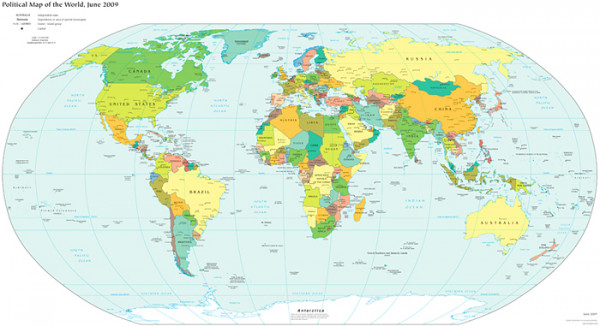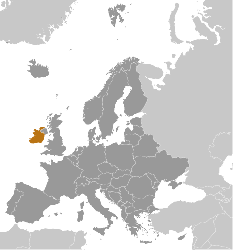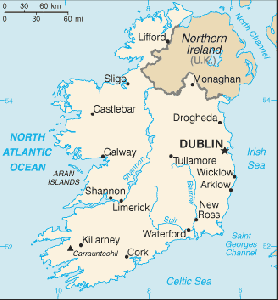Ireland
Overview
| Flag |
|
| Anthem |
Amhrán na bhFiann (The Soldier's Song) Watch on youtube (with lyrics in video description) |
| Capital |
Dublin |
| Largest city |
Dublin |
| Official language(s) |
English / Irish |
Demonyma name for a resident of a locality, often the same as the name of the people's native language
|
Irish |
| Government |
Constitutional democracy |
| Area |
70,273 km2, 27,133 sq mi |
| Population |
~ 4.5 million |
| Currency |
Euro (EUR) |
| Internet TLD |
.ie |
Geography
Ireland, also described as the Republic of Ireland, is a state in northwest Europe. It is bordered to the northeast by Northern Ireland, which is a part of the United Kingdom, and is otherwise
surroundedencircled by the Atlantic Ocean, the Irish Sea to the east, St George's Channel to the southeast, and the Celtic Sea to the south.
Ireland consists of 29 administrative counties and five cities. The five cities of Dublin, Cork, Limerick, Galway, and Waterford are
administeredgoverned, regulated separately. The capital city and at the same time the largest city of Ireland is Dublin with a population of 1,045,769 people.
Society and culture
Notable cultural
dividesdifferences exist between urban Irish and rural Irish, between the Catholic and Protestant people of Northern Ireland, between the Irish-speaking people and the English-speaking majority population.
Population
As of April 2010, Ireland's estimated population was 4,470,700. The country's population increased
significantlyreasonably large in number in recent years,
due tobecause of immigration. In addition, the birth rate in Ireland is currently over double the death rate, which is highly unusual among Western European countries. Approximately 10% of Ireland's population are
foreignfrom a different country citizens. The largest group of immigrants comes from the United Kingdom, followed by Poland, Lithuania, Nigeria and Latvia.
Languages
English and Irish are the official languages of Ireland, with English being the
dominantruling, governing one. According to the 2006 census, 39% of the population regard themselves as competent in Irish. Road signs are usually
bilingualwritten in two different languages. Most public notices and print media are in English only. Most Government
publicationsthe communication of information to the general public are available in both languages. The Polish language is one of the most widely spoken languages in Ireland after English and Irish.
Religion
Ireland's constitution provides for
freedom of religionthe right to hold any religious beliefs, and to carry out the practices of any religion. Christianity is the country's predominant religion, with the largest church being the Roman Catholic Church and the second largest being the Church of Ireland. In 2006, 86.8% of the population identified themselves as Roman Catholic, 4.4% described themselves as having no religion, and 1.7% did not respond to the question. According to a study, the country has one of the Western World's highest rates of regular
Massthe principal liturgical service of the Church attendance. Other significant Protestant denominations are the Presbyterian Church, followed by the Methodist Church.
Government and politics
Ireland is a
constitutionalconfirming to the formal system of primary principles and laws that regulates a government republic with a
parliamentaryhaving the supreme executive and legislative power resting with a cabinet of ministers chosen from system of government. The President of Ireland serves as head of state, and is elected for a seven-year term and can be re-elected only once. The current president is Mary Patricia McAleese. The Oireachtas, which is a
bicameralhaving two separate legislative chambers or houses parliament, consists of the President of Ireland, Seanad Éireann (Senate), being the Upper House, and Dáil Éireann (House of Representatives), being the Lower House.
Economy
Ireland is one of the world's most developed countries. In 2006 it had the sixth highest nominal
GDPa measure of the economic production of a particular territory in financial capital terms over a specific time period per capita. Therefore Ireland is ranked as one of the
wealthiestrichest countries in the
OECDThe Organisation for Economic Co-operation and Development. Industry, which accounts for 46% of GDP and about 80% of exports, has replaced agriculture as the country's leading economic sector. Exports play an important role in Ireland's economic growth. The country now ranks as the seventh largest producer of zinc concentrates in the world, and the twelfth largest producer of
leada heavy, pliable, inelastic metal element concentrates.






